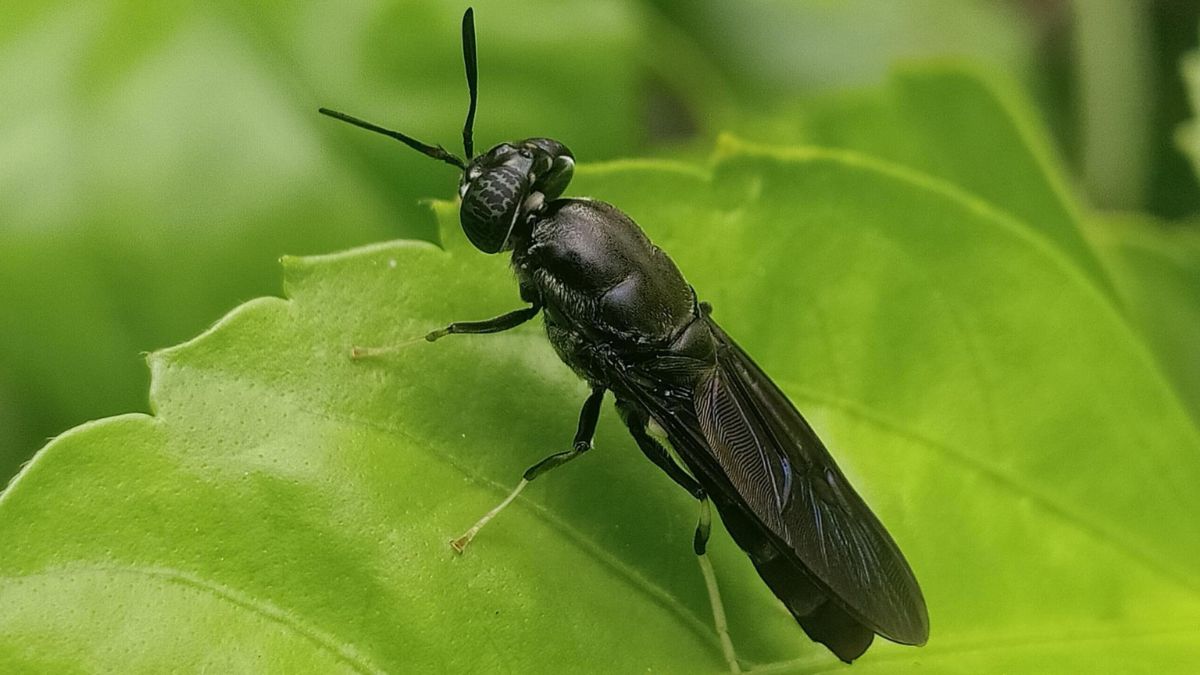HOME
The Black Soldier Fly: Nature Ultimate Waste Recycler

Imagine a creature that thrives on waste, turning what we discard into something useful and valuable. Meet the black soldier fly, nature’s ultimate recycler. This unassuming insect is not just another bug; it’s a powerhouse in the world of waste management and sustainability. With its remarkable ability to consume organic materials—from food scraps to agricultural byproducts—the black soldier fly offers innovative solutions for some of our most pressing environmental challenges. Join us as we dive deeper into the fascinating life cycle of this insect, explore its benefits in agriculture, discuss its impact on our environment, and uncover future opportunities that could reshape how we think about waste recycling.
The Life Cycle of a Black Soldier Fly
The life cycle of a black soldier fly is fascinating and efficient. It begins with the female laying hundreds of eggs in organic waste. These eggs hatch within a few days, giving rise to larvae that immediately start feeding.
During the larval stage, which lasts about two weeks, these little creatures consume vast amounts of food scraps. Their ability to convert waste into protein is remarkable. As they grow, they shed their skins multiple times, increasing in size significantly.
Once fully grown, the larvae enter a pupal stage where they undergo metamorphosis. This phase can last up to several weeks as they transform into adult flies.
After emerging from their pupae, black soldier flies have only one goal: reproduction. They live for just a week or so but play an essential role in breaking down waste during their short lifespan.
Benefits of Black Soldier Flies in Waste Management
Black soldier flies are revolutionizing waste management in various sectors. These remarkable insects can consume organic waste, transforming it into valuable resources.
Their larvae thrive on food scraps, agricultural by-products, and even animal manure. This process not only reduces the volume of waste but also accelerates decomposition.
Moreover, black soldier fly larvae convert this waste into protein-rich biomass and nutrient-dense frass—an excellent organic fertilizer. This dual benefit makes them a favorite among farmers and composters alike.
Utilizing black soldier flies minimizes landfill contributions and lowers greenhouse gas emissions associated with traditional waste disposal methods. Their ability to digest contaminants also helps in sanitizing organic matter effectively.
By harnessing these small creatures for waste recycling, communities can adopt more sustainable practices while promoting circular economies through natural processes.
How Black Soldier Flies are Used in Agriculture and Animal Feed
Black soldier flies are transforming agriculture and animal feed in remarkable ways. Their larvae, known for their rapid growth, effectively convert organic waste into high-protein feed. This process not only reduces waste but also creates a sustainable food source.
Farmers increasingly incorporate black soldier fly larvae into diets for livestock such as chickens and pigs. The protein-rich content enhances growth rates and overall health in animals. Moreover, these larvae are an excellent alternative to traditional fishmeal.
Beyond livestock, black soldier flies serve aquaculture needs too. Fish farmers utilize them as a nutritious option for various species. This shift supports healthier aquatic ecosystems while addressing overfishing concerns.
The versatility of black soldier flies extends to crop fertilization as well. Their frass—the residue left after feeding—acts as an organic fertilizer rich in nutrients, promoting soil health without chemical additives.
This innovative use of nature’s recycler showcases the potential benefits across multiple sectors within agriculture.
Environmental Impact of Black Soldier Flies
The environmental impact of the black soldier fly is significant and multifaceted. These insects serve as a natural solution to organic waste disposal, helping to reduce landfill contributions. By consuming food scraps and agricultural byproducts, they play a crucial role in minimizing waste.
Their larvae are efficient at breaking down organic material, converting it into protein-rich biomass. This not only reduces pollution but also transforms waste into valuable resources for agriculture.
Furthermore, black soldier flies have a low carbon footprint compared to traditional livestock farming. They require less land and water while producing fewer greenhouse gases.
As part of circular economy practices, their use promotes sustainability in various industries. The ability of these flies to thrive on diverse organic materials enhances ecological balance by recycling nutrients back into the soil when used as fertilizers or compost after processing.
Challenges and Controversies Surrounding Black Soldier Flies
Despite their promise, black soldier flies face several challenges and controversies. One major concern is the potential for regulatory hurdles. As industries explore their use in waste management and feed production, navigating compliance with food safety standards can be complex.
Another issue lies in public perception. Some individuals worry about introducing insects into the food chain, fearing contamination or disease transmission. Educating consumers on the benefits of black soldier flies is essential to overcome these misconceptions.
Additionally, large-scale operations require substantial investment and infrastructure. This may limit accessibility for smaller businesses or farmers who wish to adopt this sustainable solution.
Environmental impacts from mass breeding facilities can’t be overlooked. Waste management practices must ensure that they do not inadvertently create new ecological problems while addressing existing ones. These factors contribute to a broader discussion about how best to integrate black soldier flies into our systems sustainably.
Future Applications and Research for Black Soldier Flies
The future of black soldier flies (BSF) is filled with exciting possibilities. Research continues to explore their potential beyond waste recycling. Scientists are investigating BSF’s role in bioconversion processes, turning organic waste into high-quality protein and essential nutrients.
Innovations in genetic engineering may enhance the efficiency of these insects. By modifying certain traits, researchers aim to maximize their growth rates and resilience against diseases, making them an even more attractive option for sustainable practices.
Additionally, studies are examining how BSFs can be integrated into circular economy models. This could streamline food production systems while reducing reliance on traditional feed sources.
Collaboration among agricultural stakeholders and environmental scientists is vital as the industry grows. Understanding consumer acceptance will also shape future applications, ensuring that black soldier flies become a staple in eco-friendly solutions.
Conclusion
The black soldier fly stands out as a remarkable agent of change in waste management and agriculture. With its ability to transform organic waste into valuable protein, it plays a critical role in reducing landfill use and enhancing food production sustainability. The life cycle of the black soldier fly is intricate yet efficient, showcasing nature’s ingenuity.
Utilizing these flies presents numerous benefits for farmers and the environment alike. They provide an alternative source of animal feed that reduces dependence on traditional livestock feeds, which can be resource-intensive to produce. Moreover, their capacity to recycle organic waste minimizes greenhouse gas emissions associated with decomposition.
As research progresses, innovative applications for the black soldier fly continue to emerge. From biofuel production to potential uses in bioplastics, the future looks promising for this tiny insect with big impacts.
However, challenges persist regarding regulatory frameworks and public perception. Addressing these concerns will be essential for harnessing the full potential of black soldier flies in our global efforts toward sustainable practices.
Embracing the capabilities of black soldier flies could lead us towards a more eco-friendly approach to managing waste while supporting agricultural needs—an exciting prospect worth exploring further.
HOME
Crypto30x.com Review: Navigating the LoopNet Marketplace for Digital Investors

In today’s fast-paced digital landscape, finding the right platform for your crypto investments can feel like searching for a needle in a haystack. Enter Crypto30x.com—a dynamic marketplace that promises to revolutionize how you engage with real estate assets through cryptocurrency. But what sets it apart? With its integration of LoopNet, a leading commercial real estate listing service, Crypto30x.com opens up an exciting avenue for savvy investors eager to blend traditional investment strategies with modern financial technology.
Imagine having access to high-quality commercial properties while using your favorite cryptocurrencies. It sounds enticing and could be the game-changer you’ve been looking for. In this review, we’ll unravel how Crypto30x.com works within the LoopNet marketplace and explore whether it’s truly worth your time and capital as a digital investor. Buckle up; we’re diving into a new era of investing!
How Crypto30x.com Works for Digital Investors
Crypto30x.com offers a streamlined platform designed specifically for digital investors looking to navigate the complexities of crypto assets. The user interface is intuitive, making it easy for both beginners and seasoned traders to explore various investment opportunities.
Once registered, users can access an array of tools that assist in managing their portfolios. Real-time analytics and market trends help inform strategic decisions. This is particularly valuable in the fast-paced world of cryptocurrency.
Investors can directly engage with listings available on LoopNet, allowing them to identify potential investments quickly. The integration between Crypto30x.com and LoopNet creates a unique ecosystem where real estate meets digital currency, opening new avenues for wealth generation.
Whether you’re interested in buying or leasing properties through crypto transactions, this platform simplifies the process significantly. Flexibility is key here; you choose how deeply you’d like to dive into this emerging market landscape.
The Benefits of Using Crypto30x.com for Crypto Investing
Crypto30x.com offers a streamlined gateway for digital investors looking to capitalize on the burgeoning crypto market. Its user-friendly interface simplifies the often complex process of buying and selling cryptocurrencies.
One standout feature is its integration with LoopNet, enabling users to explore unique investment opportunities in commercial real estate tied to crypto assets. This connection makes it easier for investors to diversify their portfolios.
Security measures are robust, ensuring that transactions remain private and safeguarded against potential threats. Additionally, educational resources abound—helping novice traders understand market trends and make informed decisions.
The platform also supports various payment methods, allowing flexibility when funding accounts or cashing out profits. With its comprehensive tools and resources, Crypto30x.com empowers investors at all levels to navigate the ever-evolving world of digital finance confidently.
Potential Risks and Limitations of Crypto30x.com
While Crypto30x.com offers appealing opportunities, it’s essential to recognize potential risks. The cryptocurrency landscape can be volatile. Prices may fluctuate dramatically within short periods, possibly leading to significant losses.
Another concern involves the platform’s relative newness. Limited user feedback exists, making it challenging for investors to gauge its reliability fully. As with any emerging technology or marketplace, there’s uncertainty about long-term viability.
Additionally, security remains a pressing issue in digital investing. While Crypto30x.com likely employs various protective measures, breaches can occur anywhere in the crypto space.
Users might encounter challenges navigating the LoopNet marketplace if they lack prior experience with such platforms. Familiarizing oneself with tools and resources is crucial but may require time and effort that some are not prepared for.
Tips for Navigating the LoopNet Marketplace on Crypto30x.com
When exploring the LoopNet marketplace on Crypto30x.com, clarity is key. Begin by familiarizing yourself with the interface. A user-friendly layout helps streamline your search for investment opportunities.
Next, leverage filters effectively. Narrow down options based on location, price range, and property type to find what meets your specific criteria quickly.
Stay informed about market trends. Regularly check updates and new listings to spot emerging opportunities before they become widely known.
Engage with the community as well. Forums or discussion groups related to Crypto30x can provide insights from seasoned investors that might not be available elsewhere.
Always perform due diligence before making any investments. Research properties thoroughly and assess their potential risks along with rewards for a smarter investing strategy on this platform.
Success Stories from Digital Investors on Crypto30x.com
Numerous digital investors have found notable success through Crypto30x.com. They’ve harnessed the platform’s unique offerings to maximize their crypto portfolios.
One investor, Alex, shared how he turned a modest investment into substantial gains by leveraging the LoopNet marketplace features on Crypto30x.com. He pinpointed undervalued assets that others overlooked and made strategic moves at just the right times.
Another story comes from Maria, who utilized advanced analytics tools available on the platform. By studying market trends closely, she was able to make informed decisions that led her to significant profits in a short period.
These experiences reflect a growing community of savvy investors finding their footing in digital markets. Each story adds credibility and inspiration for those considering joining Crypto30x.com’s vibrant ecosystem. The potential is palpable when armed with the right tools and insights from real users navigating this dynamic landscape.
Is Crypto30x.com Worth It? An Honest Review
Evaluating the worth of Crypto30x.com requires a close look at its features and user experiences. Many investors appreciate its intuitive interface, making navigation seamless even for beginners. It’s designed to simplify crypto investments while tapping into the LoopNet marketplace, which can be a game changer.
User feedback often highlights responsive customer support that is quick to address concerns. This level of service can enhance overall satisfaction when venturing into digital investing.
However, it’s essential to consider potential pitfalls too. Some users report challenges with transaction speeds during high-traffic periods. Others mention fluctuating fees that could eat into profits.
Your decision hinges on what you value most in an investment platform—usability or robust functionality? Weighing these factors will help you determine if Crypto30x.com aligns with your investment goals and risk tolerance.
Conclusion
Navigating the world of digital investments can be daunting, but platforms like Crypto30x.com and its integration with the LoopNet marketplace are changing that landscape. For those interested in blending cryptocurrency with commercial real estate, this platform offers a unique opportunity to diversify investment portfolios.
Investors have shared positive experiences using Crypto30x.com, highlighting its user-friendly interface and comprehensive resources. Risk management is crucial; understanding potential pitfalls ensures informed decision-making. Furthermore, knowing how to effectively navigate the LoopNet marketplace enhances your investment strategy.
The features available on Crypto30x.com cater specifically to the needs of digital investors looking for innovative ways to grow their assets. It’s essential to weigh the benefits against possible risks while exploring this modern approach to investing.
With diligence and awareness, many find value in what Crypto30x.com has to offer within the vibrant world of crypto and real estate investment. Whether you’re a seasoned investor or just starting out, taking advantage of such platforms could lead you toward greater financial success.
HOME
Criss Cross Influence: How They Shaped a Generation of Young Artists

Art has always thrived on connections and collaborations. At the heart of this vibrant tapestry is a fascinating phenomenon known as Criss Cross Influence. It’s where artists from different disciplines inspire one another, creating ripples that shape entire generations. Picture musicians feeding off poets’ words or painters drawing inspiration from song lyrics – it’s a beautiful intertwining of creativity that transcends boundaries.
The term may be relatively new, but its roots run deep in art history. As we explore how this influence has manifested through the years, you’ll discover some iconic relationships between creative minds that have changed the landscape forever. From legendary bands like Criss Cross to avant-garde writers and visionary visual artists, their interconnectedness continues to spark innovation today.
Join me as we dive into an exploration of how these artistic exchanges have impacted various genres and shaped contemporary culture in our digital age!
The origins and history of the term
The term “Criss Cross Influence” emerged in the late 20th century. It describes a dynamic interaction among artists, where inspiration flows back and forth between them.
Initially, it was used to highlight how musicians inspired one another across genres. Think of jazz and rock—where improvisation meets structured melodies.
As time passed, this concept expanded beyond music. Writers began borrowing themes and styles from each other’s works. Visual artists also joined the movement, creating pieces that reflected overlapping ideas.
Notably, collaborations became more frequent during this period. Artists realized they could create something new by merging their influences.
This synergy laid the groundwork for a vibrant creative community. The notion of sharing ideas took root deeply within various art forms as generations evolved together through mutual respect and admiration.
Famous examples of artists who were influenced by each other
The world of art is rich with examples of criss cross influence. Think about the dynamic relationship between Bob Dylan and The Beatles. Each artist pushed the other towards new creative heights, blending folk and rock in groundbreaking ways.
In literature, consider F. Scott Fitzgerald and Ernest Hemingway. Their rivalry fueled innovation in modern prose, leading to distinct yet interwoven styles that shaped 20th-century writing.
Visual artists also showcase this phenomenon. Picasso’s cubism inspired contemporaries like Georges Braque, while their collaboration resulted in a vibrant dialogue that transformed visual expression.
These intertwining paths not only highlight individual genius but also underscore how interconnected creativity can ignite movements across various artistic disciplines. Through exploration and exchange, they cultivated an environment ripe for experimentation and evolution within their respective fields.
Impact on different genres of art (music, literature, visual arts)
Criss Cross Influence has left an indelible mark across various artistic realms. In music, genres blend seamlessly. Rock bands borrow from folk traditions while hip-hop artists sample jazz and soul, creating innovative sounds that resonate deeply.
In literature, authors often draw inspiration from peers. The interplay between poets and novelists can spark new movements. For instance, the Beat Generation’s influence on contemporary writers showcases how ideas traverse boundaries.
Visual arts thrive on this interchange as well. Artists like Basquiat were influenced by street culture and classical art forms alike. This blending of styles leads to unique expressions that challenge traditional norms.
The beauty lies in how these influences create something truly original yet rooted in shared experiences. Each artist contributes to a collective narrative, enriching the cultural landscape for generations to come.
How Criss Cross Influence has evolved in today’s digital age
The digital age has transformed the landscape of Criss Cross Influence. Artists now interact globally in real-time, breaking traditional barriers that once limited their reach.
Platforms like social media enable instant sharing and collaboration. Musicians, writers, and visual artists draw inspiration from diverse cultures with a few clicks. This interconnectedness fosters innovative blends of styles.
Streaming services have redefined how we consume art. Genres merge effortlessly as influences spread across borders at lightning speed. A pop artist today might pull elements from jazz or classical seamlessly.
Additionally, online communities allow emerging talent to showcase their work alongside established names. The dynamics of influence are more reciprocal than ever; young creators inspire seasoned professionals just as much as they absorb from them.
This evolution is not without challenges though—navigating originality while honoring borrowed ideas remains a delicate balance for many artists in this bustling digital marketplace.
Controversies and criticisms surrounding the concept
The concept of Criss Cross Influence often sparks heated debates among art critics and scholars. Some argue that it dilutes originality, claiming artists rely too heavily on each other’s work instead of forging their unique paths.
Critics point out how this interconnectedness can lead to a lack of authenticity. They worry that the constant referencing and borrowing might stifle innovation in favor of safe imitations.
Moreover, discussions around crediting original sources frequently arise. Who deserves recognition when countless layers of influence intertwine? This ambiguity complicates the narrative surrounding artistic merit.
In certain cases, controversial figures have been accused of capitalizing on another’s style without acknowledgment. Such actions raise ethical questions about respect and integrity in creative fields.
As digital platforms expand, these issues become even more pronounced. The ease with which content is shared amplifies concerns regarding appropriation versus inspiration within the realm of modern artistry.
The lasting legacy and influence on current and future generations of artists
The legacy of Criss Cross Influence resonates strongly in today’s artistic landscape. Emerging artists often draw inspiration from a diverse mix of styles, reflecting the interconnectedness that defined earlier generations.
Collaborations between musicians, writers, and visual artists flourish. This trend showcases how influences ripple across disciplines, creating innovative works that push boundaries.
Social media has amplified these connections. Artists now share their inspirations openly, leading to dynamic conversations and fresh interpretations. Platforms allow for instant feedback and collaboration like never before.
As young talents explore varied influences, they embrace the idea that creativity knows no boundaries. Each generation builds upon the last while adding its own voice to the conversation.
This synergy ensures that art remains vibrant and ever-evolving. The spirit of Criss Cross Influence continues to thrive as it shapes tomorrow’s creators into unique storytellers and visionaries.
Conclusion
Recognizing the power of Criss Cross Influence is essential in today’s creative landscape. Artists are not isolated entities; they flourish through interconnectedness and inspiration from one another. The ripple effect of collaboration, whether direct or indirect, shapes art across all genres.
Artists like the band Criss Cross have exemplified this phenomenon by blending styles and ideas that resonate with diverse audiences. Their music has inspired countless young musicians to explore new sounds while honoring their influences. This blend creates a rich tapestry of creativity that speaks to our shared human experience.
The digital age has amplified these connections further, allowing artists to share their work globally in an instant. Social media platforms enable real-time collaborations and encourage experimentation across various forms of art.
As we look ahead, embracing this ongoing dialogue between generations will be crucial for innovation in artistic expression. By acknowledging those who came before us while paving our own paths, we create a vibrant ecosystem where creativity thrives without boundaries.
Recognizing the significance of Criss Cross Influence helps foster an environment where artists feel motivated to influence each other positively. It encourages growth, challenges norms, and ultimately enriches our cultural dialogue for years to come.
HOME
10 Creative Ways to Use ChatGPT for Your Blogging Needs

In the world of blogging, creativity is key. But sometimes, even the most seasoned writers hit a wall. Enter ChatGPT—a powerful tool that can transform your writing process and amplify your content creation efforts. Whether you’re aiming to spark fresh ideas or enhance existing posts, ChatGPT offers a wealth of possibilities at your fingertips.
Imagine having an intelligent assistant ready to brainstorm blog topics or craft compelling introductions while you focus on what you do best: connecting with your audience. With its advanced natural language processing capabilities, ChatGPT isn’t just another AI; it’s a creative partner that can help take your blog to new heights.
Curious about how to make the most out of this innovative technology? Let’s dive into ten creative ways you can leverage ChatGPT for all your blogging needs!
How ChatGPT Works and Its Main Features
ChatGPT operates on advanced language processing technology. It understands context through deep learning, enabling it to generate human-like text responses.
The core feature of ChatGPT is its conversational ability. Users can engage in a dialogue, asking questions or giving prompts. The model responds dynamically based on the input received.
Another standout aspect is its versatility. Whether you’re looking for creative writing, technical explanations, or casual conversation, ChatGPT adapts seamlessly to various topics.
Moreover, it learns from vast amounts of data. This extensive training allows it to mimic different writing styles and tones effectively.
Real-time interaction makes ChatGPT an exciting tool for content creators. Instant feedback and suggestions can enhance productivity and creativity alike without any delay in response time.
Using ChatGPT for Generating Blog Post Ideas
Struggling to come up with fresh blog post ideas? ChatGPT can be your creative boost. This AI tool generates a wide range of topics tailored to your niche.
Simply input keywords related to your field, and watch as it churns out suggestions. From trending subjects to evergreen content, the possibilities are endless.
Using ChatGPT helps you think outside the box. You might discover themes you hadn’t considered before. This not only saves time but also sparks inspiration for deeper exploration.
Want specific angles or formats? Ask ChatGPT! It can provide listicles, how-to guides, or even opinion pieces based on current events.
Embrace this innovative approach to brainstorming. You’ll find that generating engaging content becomes more enjoyable and less daunting with a little help from technology.
Enhancing Blog Titles with ChatGPT
Crafting captivating blog titles can be a challenge. ChatGPT comes to the rescue by generating eye-catching options that grab attention.
Simply input your topic or theme, and watch as the AI brainstorms creative variations. Whether you prefer playful, informative, or provocative tones, ChatGPT adapts to your style.
Experiment with different approaches like posing questions or using numbers in titles for added intrigue. For example, instead of “Tips for Healthy Living,” try “7 Secrets to Transform Your Health Today.” This approach sparks curiosity among potential readers.
Additionally, you can enhance existing titles by asking ChatGPT for alternatives that resonate more effectively with your target audience. The result? Titles that not only attract clicks but also set the tone for engaging content ahead.
With its help, you’ll never run short on inspiration when it’s time to name your latest pieces!
Personalizing Content with ChatGPT
Personalizing content can transform a standard blog into a memorable experience. ChatGPT is an excellent tool for this.
With its advanced algorithms, it analyzes reader preferences based on past interactions. This allows you to tailor your writing according to what resonates most with your audience.
Imagine being able to suggest related articles or products that align perfectly with individual interests. ChatGPT can help craft those personalized recommendations seamlessly within your posts.
Additionally, it can adjust the tone and style of the content based on user demographics. Whether your readers prefer casual language or professional jargon, ChatGPT adapts accordingly.
Engaging users becomes easier when they feel understood and valued. By leveraging AI-driven personalization through ChatGPT, bloggers create a deeper connection with their audience while enhancing overall engagement.
Creating Engaging Introductions with ChatGPT
An engaging introduction sets the tone for your entire blog post. With ChatGPT, crafting these compelling openings becomes a breeze.
Simply prompt it with your main topic or theme. It can generate multiple intriguing opening lines that draw readers in. Whether you’re aiming for humor, intrigue, or authority, ChatGPT adapts to your desired style.
You can also ask it to provide questions that pique curiosity related to your subject matter. This technique invites readers to ponder and encourages them to read further.
Additionally, incorporating storytelling elements enhances engagement even more. Let ChatGPT suggest personal anecdotes or scenarios relevant to your content.
With its ability to produce varied ideas quickly, you’d never run out of ways to hook your audience right from the start—ensuring they stick around for what follows.
Generating Unique Conclusion Paragraphs with ChatGPT
Crafting a powerful conclusion can often be challenging. This is where ChatGPT shines, helping you tie up your thoughts seamlessly.
Simply input the main points of your blog post into ChatGPT. The AI will analyze and weave them together into a cohesive ending that resonates with readers.
You can adjust the tone to match your writing style—whether it’s professional, casual, or even humorous. This flexibility allows for personalized touches that make each conclusion unique.
Moreover, consider adding a call-to-action to inspire further engagement. Suggest readers explore related topics or share their opinions in the comments section.
With ChatGPT’s assistance, you’ll transform conclusions from mere afterthoughts into impactful statements that leave lasting impressions on your audience.
Improving SEO with ChatGPT
Improving SEO with ChatGPT can significantly boost your blog’s visibility. By leveraging its powerful language generation capabilities, you can create content that is not only engaging but also optimized for search engines.
Begin by using ChatGPT to identify trending keywords relevant to your niche. It can analyze search data and help you understand what topics resonate most with your audience.
Next, generate high-quality meta descriptions and alt text for images. These elements are crucial for enhancing on-page SEO and ensuring that search engines properly index your content.
Furthermore, consider utilizing ChatGPT to craft compelling calls-to-action (CTAs). A well-placed CTA encourages readers to engage further or share your post, increasing dwell time—an essential factor in SEO ranking algorithms.
Let this tool assist in creating a comprehensive internal linking strategy as well. It helps establish context between posts while guiding users through related content effortlessly.
Utilizing ChatGPT for Social Media Posts
Crafting social media posts can be time-consuming. ChatGPT streamlines this process with its quick and creative suggestions.
Need a catchy caption? Just input your idea or theme, and watch as ChatGPT generates multiple options that resonate with your audience. This can save valuable time and enhance engagement.
Additionally, tailoring content for different platforms is effortless. Whether it’s Twitter’s brevity or Instagram’s visual storytelling, ChatGPT adapts to each format seamlessly.
You can also brainstorm hashtags that boost visibility. With relevant tags recommended by AI, your posts stand a better chance of reaching wider audiences.
Moreover, consider using ChatGPT for responding to comments or messages. It helps maintain an active presence while ensuring responses are engaging and thoughtful without draining your energy.
This innovative tool transforms how you approach social media strategy, allowing you to focus on what truly matters: connecting with your audience effectively.
Enhancing SEO with the Use of ChatG
Search engine optimization is crucial for any blog’s success, and ChatGPT can be a valuable ally in this area. With its advanced language capabilities, it can help you identify relevant keywords that resonate with your target audience.
Using ChatGPT, you can generate keyword-rich content that flows naturally. This ensures that your posts are not only informative but also optimized for search engines.
Moreover, ChatGPT assists in creating meta descriptions and alt text for images. These elements play an essential role in improving visibility on search results pages.
Another advantage lies in backlink strategies. By analyzing existing content, ChatGPT helps pinpoint opportunities to interlink related articles effectively.
Incorporating structured data into your posts becomes easier too. You can ask ChatGPT to suggest ways to format information for better indexing by search engines. Its versatility enhances both the quality of your content and its discoverability online.
Understanding the Capabilities of ChatGPT
ChatGPT is more than just a chatbot; it’s an advanced AI language model that can transform how you create content. Designed to understand and generate human-like text, it offers versatility in various applications.
This technology leverages vast datasets, capturing nuances of language and context. It excels at generating coherent responses based on prompts provided by users. Whether you’re brainstorming ideas or drafting detailed articles, ChatGPT adapts to your needs.
Its capability extends beyond simple conversations. You can use it to enhance creativity, streamline workflows, and even optimize SEO strategies for your blog posts.
The intuitive design allows for interactive engagement. This makes it easy to refine outputs based on user feedback, creating a collaborative writing experience like never before. With ChatGPT as a tool in your arsenal, the possibilities are endless when crafting compelling content.
Using ChatGPT for Generating Blog Topics
Generating fresh blog topics can be a challenge. Thankfully, ChatGPT offers an innovative solution. By leveraging its vast database and language capabilities, you can brainstorm unique ideas effortlessly.
Simply input your niche or interest area into the chat interface. Watch as it churns out a variety of potential topics tailored to your audience’s preferences. This not only saves time but also sparks creativity.
You might discover angles you hadn’t considered before. It could inspire series posts or deep dives into specific subjects relevant to current trends.
Additionally, using ChatGPT allows for quick adjustments based on feedback or emerging industry changes. As the conversation unfolds, feel free to refine your prompts for even more targeted suggestions that resonate with your readers’ interests and needs.
Creating Engaging Introductions and Headlines with ChatGPT
Crafting engaging introductions and headlines can be a daunting task. This is where ChatGPT shines. With its ability to understand context, it helps generate attention-grabbing openings that hook readers immediately.
Imagine typing in your blog topic and receiving multiple compelling introduction options within seconds. You’ll find phrases that resonate with your audience’s interests, evoking curiosity from the very first line.
Headlines are equally crucial for attracting clicks. ChatGPT can create a variety of catchy titles tailored to different tones—whether you need something playful or professional, it’s covered.
Using this tool not only saves time but also sparks creativity. It encourages exploration of angles you might not have considered before. By leveraging ChatGPT’s capabilities, you’ll elevate the quality of your blog posts from the get-go.
Crafting Captivating Blog Content with ChatGPT
Crafting captivating blog content has never been easier with ChatGPT. This powerful tool can help you brainstorm fresh ideas, allowing your creativity to flow without limits.
You can provide a simple prompt or theme, and ChatGPT will generate engaging paragraphs that pull readers in. Whether it’s storytelling, how-to guides, or informative pieces, the versatility of this AI makes it adaptable to any niche.
Moreover, ChatGPT enables writers to maintain their unique voice while enhancing clarity and engagement. By suggesting synonyms or alternative phrases, it helps avoid monotony in your writing.
Need a specific angle on a topic? Just ask! The AI’s ability to understand context ensures that the content generated aligns with your vision.
Experimenting with different styles is another perk; you might discover new ways of expression that resonate more deeply with your audience.
Generating Interactive Quizzes and Surveys with ChatGPT
Interactive quizzes and surveys can breathe new life into your blog. With ChatGPT, you can create engaging content that captures reader interest effortlessly.
Imagine designing a quiz that not only tests knowledge but also entertains. You can ask ChatGPT to generate questions based on any topic relevant to your niche. This tool understands context and can provide diverse question formats—from multiple choice to true or false.
Surveys become a breeze too. Use ChatGPT to formulate clear, concise questions tailored for your audience’s preferences. It helps in gathering valuable feedback while keeping readers engaged.
You might even consider adding personality-driven quizzes. These draw users in by offering insights based on their answers, making them feel connected to your content.
With these interactive elements powered by ChatGPT, you enhance user experience significantly while maintaining the fun factor of blogging.
Enhancing Reader Engagement with ChatGPT-Powered Comments Section
Imagine a comments section that feels like a conversation rather than just a list of remarks. ChatGPT can turn this vision into reality by providing real-time responses to readers’ questions and comments.
With its ability to understand context, ChatGPT can generate thoughtful replies that encourage further discussion. This interaction keeps the dialogue going and makes readers feel valued.
Utilizing ChatGPT in your blog’s comments section fosters community engagement. It invites users to share their thoughts without fear of being ignored or receiving generic responses.
Additionally, you can customize ChatGPT’s tone and style to match your brand voice. Whether casual or professional, it adapts seamlessly while maintaining authenticity.
By implementing this AI tool, you transform passive reading into an engaging experience where every visitor contributes meaningfully.
Personalizing User Experience with ChatGPT-Based Product Recommendations
ChatGPT can transform how you approach product recommendations on your blog. By leveraging its natural language processing capabilities, you can create personalized experiences for your readers.
Imagine a scenario where visitors receive tailored suggestions based on their past interactions or preferences. ChatGPT analyzes user behavior to generate relevant product choices, enhancing the shopping experience.
Integrating this AI model into your platform allows for dynamic updates. As users engage with different content, the recommendations evolve in real-time, keeping them interested and encouraging repeat visits.
This level of personalization fosters a deeper connection between bloggers and their audience. It shows that you’re attentive to their needs and interests while driving conversions effectively.
Using ChatGPT not only makes users feel valued but also boosts engagement metrics across your site, turning casual readers into loyal customers over time.
conclusion
ChatGPT has revolutionized the way bloggers create content. By harnessing its capabilities, you can elevate your blogging experience to new heights. From generating unique ideas to crafting engaging introductions and conclusions, ChatGPT offers endless possibilities.
Not only does it help in brainstorming topics, but it also enhances your titles and ensures that your content is personalized for each reader. The tool allows you to fine-tune every aspect of your writing while improving SEO strategies along the way.
Utilizing ChatGPT for social media posts extends your reach even further, turning casual followers into active readers. Engaging quizzes or surveys powered by this AI can also boost interaction on your blog.
This innovative technology opens doors for deeper connections with audiences through personalized recommendations and feedback mechanisms. As you explore these creative ways to integrate ChatGPT into your blogging routine, you’ll find that inspiration flows more freely than ever before.
Embrace the power of this AI tool and watch as it transforms not just how you write but how effectively you engage with an audience hungry for fresh content.
-

 ENTERTAINMENT9 months ago
ENTERTAINMENT9 months agoThe Best Platforms to Watch Cartoon Online: A Comprehensive Guide
-

 HOME5 months ago
HOME5 months agoTaste the Magic: A Guide to Disney Food Blogging
-

 HOME2 months ago
HOME2 months agoExploring Zev Technologies: High-Performance Firearm Accessories
-

 HOME2 months ago
HOME2 months agoThe Art of Connection: Discovering Meaningful Interactions Today
-

 EDUCATION11 months ago
EDUCATION11 months agoTop 10 Countries with the Best Educational Systems: A Global Comparison
-

 HOME5 months ago
HOME5 months agoFuture Gadgets Unleashed: Stay Ahead with Our Comprehensive Blog Articles
-

 HEALTH4 months ago
HEALTH4 months agoReal Experiences with Ambetter Health: Customer Reviews and Insights
-

 HEALTH10 months ago
HEALTH10 months agoNavigating Challenges Together: A Deep Dive into the Small Heath Alliance Forum’s Mission
